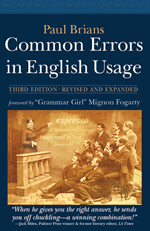In what follows, “accent mark” will be used in a loose sense to include all diacritical marks that guide pronunciation. Operating systems and programs differ in how they produce accent marks, but it’s worth learning how yours works. Writing them in by hand afterwards looks amateurish.
Words adopted from foreign languages sometimes carry their accent marks with them, as in “fiancé, ” “protégé,” and “cliché.” As words become more at home in English, they tend to shed the marks: “Café” is often spelled “cafe.” Unfortunately, “résumé” seems to be losing its marks one at a time (see under “vita/vitae”).
Many computer users have not learned their systems well enough to understand how to produce the desired accent and often insert an apostrophe (curled) or foot mark (straight) after the accented letter instead: “cafe’.” This is both ugly and incorrect. The same error is commonly seen on storefront signs.
So far we’ve used examples containing acute (right-leaning) accent marks. French and Italian (but not Spanish) words often contain grave (left-leaning) accents; in Italian it’s a caffè. It is important not to substitute one kind of accent for the other.
The diaeresis over a letter signifies that it is to be pronounced as a separate syllable: “noël” and “naïve” are sometimes spelled with a diaeresis, for instance. The umlaut, which looks identical, modifies the sound of a vowel, as in German Fräulein (girl), where the accent mark changes the “frow” sound of Frau (woman) to “froy.” Rock groups like “Blue Öyster Cult” scattered umlauts about nonsensically to create an exotic look.
Spanish words not completely assimilated into English like piñata and niño retain the tilde, which tells you that an “N” is to be pronounced with a “Y” sound after it.
In English-language publications accent marks are often discarded, but the acute and grave accents are the ones most often retained.
Back to list of errors

BUY THE BOOK!
